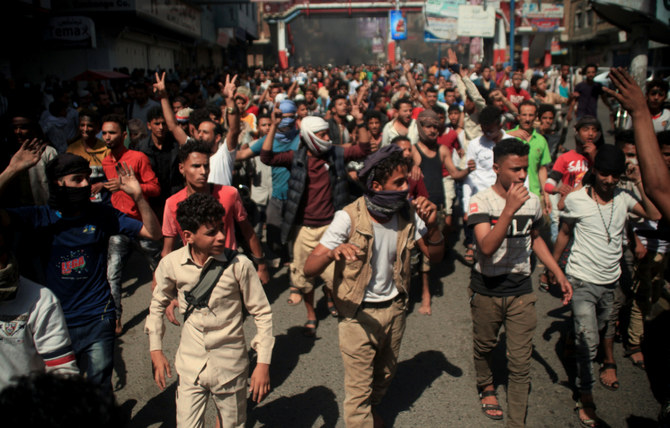AL-MUKALLA: As Yemen’s prime minister touched down on Tuesday in the port city of Aden for the first time in months, thousands of Yemenis took to the streets of the southern city of Taiz and many other cities to protest against the country’s plunging currency and skyrocketing prices.
Maeen Abdul Malik Saeed returned to Aden, the interim capital of Yemen, to revive hopes of quick and full implementation of the Riyadh Agreement and address the financial meltdown that has paralyzed the country.
The prime minister and his cabinet left Aden in March after separatist protesters stormed the presidential palace.
For the second consecutive day, demonstrators marched around the densely populated Taiz carrying loaves of bread and posters. They demanded the government pay salaries and address the devaluation of the Yemeni riyal along with increasing prices of fuel and food.
“I am hungry,” one protester shouted as security forces and armed vehicles were deployed outside key government facilities. Some protesters blocked roads and torched car tires.
On Monday, at least five protesters were wounded when security forces fired live bullets to prevent protesters from blocking roads and disrupting traffic.
The security committee in the city said it was safeguarding peaceful protests and warned against attacking private and public property.
On Sept. 15, two protesters were killed during violent demonstrations over the economic meltdown and intensifying power cuts in Aden and Al-Mukalla. The protesters clashed with security forces, burnt garbage and tires, and stormed public facilities.
The Yemeni riyal this week hit a record low against the dollar, trading at 1,200. The US dollar traded at 215 riyals in January 2015.
In August, tough punitive measures by the Aden-based central bank against several currency-exchange firms that violated monetary rules helped the riyal recover by 10 percent, surging from 1,050 to 950.
But the Yemeni riyal tumbled in the following weeks — breaking the historic 1,200 against the US dollar for the first time — as many firms have closed and banks in Houthi-controlled areas are being asked to relocate their operations to Aden.
On Tuesday, the central bank monitors inspected local exchange firms and shops, looking for violators of the bank’s rules. The banks also announced that the Bank of England had agreed to unfreeze its account, giving it access to millions of dollars.
At the same time, economists have warned that the deepening financial meltdown would exacerbate the already dire humanitarian crisis in Yemen and would fuel violence.
Waled Al-Attas, an assistant professor of finance and banking sciences at Hadramout University, criticized the Yemeni government’s silence and late solutions to the continuing depreciation of the Yemeni riyal.
“The state has given up doing the simplest things for the citizens and left them in the lurch,” he told Arab News. “This situation spells a real catastrophe as the plunging of the riyal continues and prices are going up. Salaries lost their values.”
During a brief visit to the southern city of Shabwa on Monday, the Yemeni premier attributed the fall of the riyal and the financial crisis in the country to the parallel Houthi economy and the movement’s military operations along with speculative activities by currency traders.
“The economic situation is very difficult,” he said.
Meanwhile, fighting has raged between Yemeni government troops and the Houthis over the past 24 hours in the province of Jouf and the central province of Marib. Dozens of combatants on both sides were killed.
The fiercest clashes on Tuesday were reported in Hareb district, south Marib province, where government troops, backed by air support from the Arab coalition warplanes, thwarted consecutive Houthi attacks.
The rebels have recently opened new fronts south of Marib city after their forces failed to make major headway in their push west of Marib. In the Jouf province, government troops announced liberating a number of locations, east of Hazem city, the province’s capital.
























